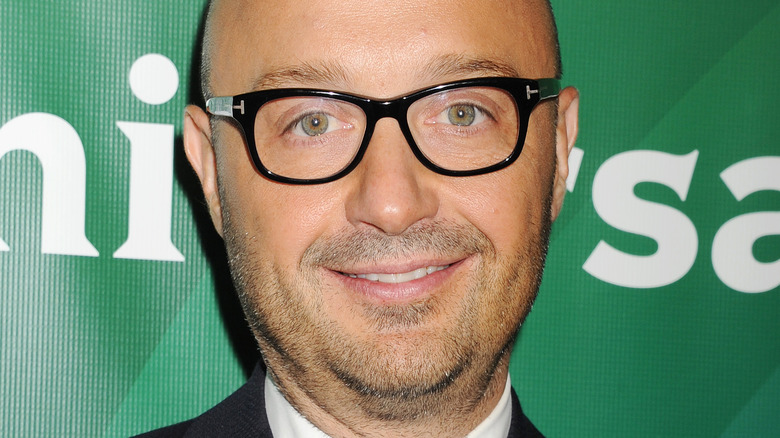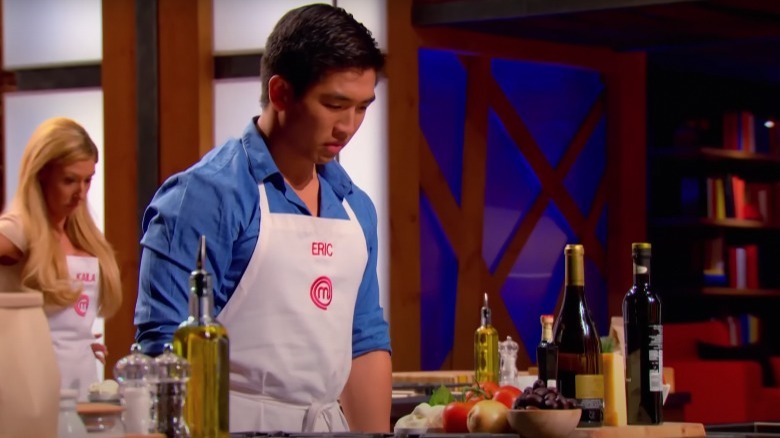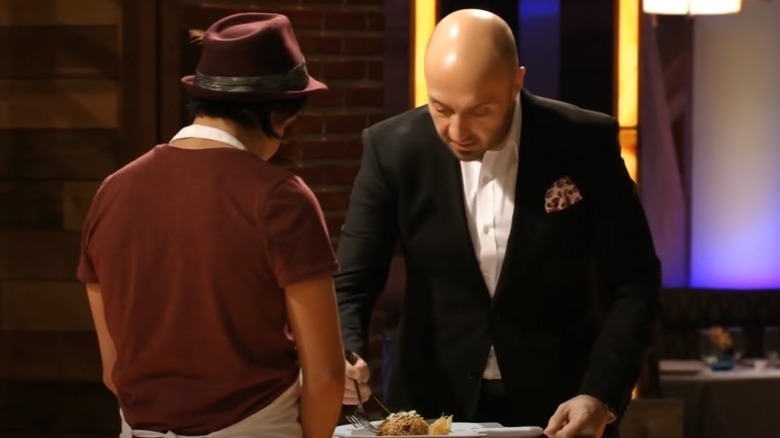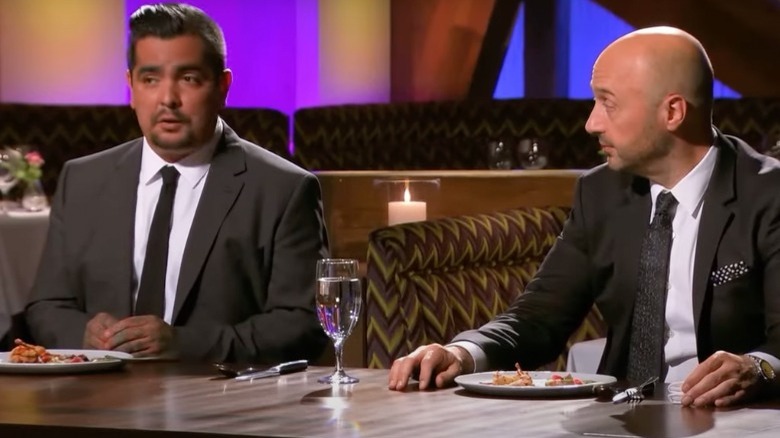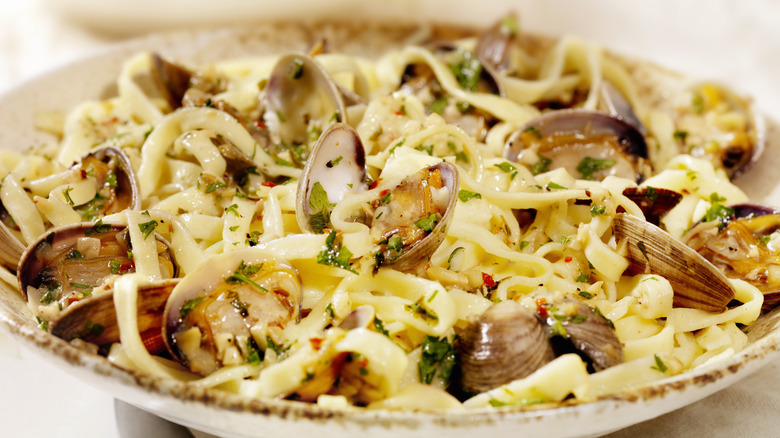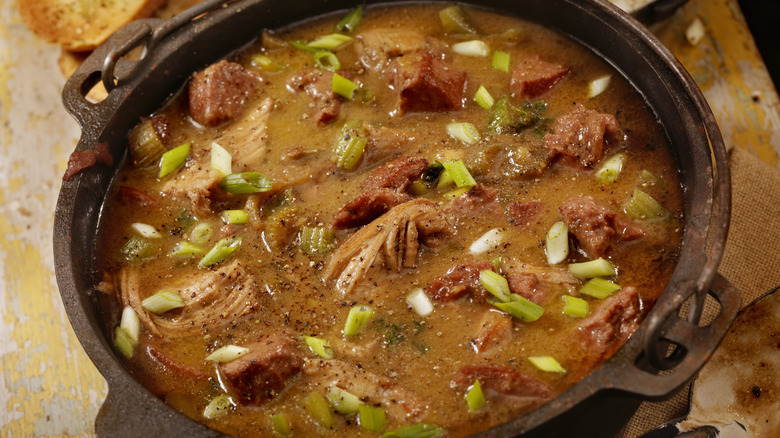Joe Bastianich's Rules For MasterChef And Avoiding Terrible Pasta - Exclusive Interview
In 2011, Joe Bastianich described his superhero mission on "MasterChef" to Jimmy Fallon: "I'm not mean!" he assured us. "But when bad food happens to good people, it's a problem, and I'm there to stop that." (YouTube has preserved the clip, should you want a refresher.) For over a decade, the "MasterChef" judge and celebrated restaurateur has valiantly stuck to his guns.
Has the bastion of excellence gone soft, or is Season 13 fundamentally different? So far on "MasterChef: United Tastes of America," Bastianich told Mashed that he's tasted a "perfectly seasoned" steak, been surprised by "tasty" — deconstructed! — coleslaw, and "amazed" by gumbo. Can we all agree that those are a lot of positives for a food critic notorious for glowering silences and throwing plates of contestants' food into the trash?
Then again, Bastianich didn't have to throw a toddler-sized temper tantrum over Wayne Lewis' failed attempt at a pumpkin risotto — social media did that for him. By now, we dread the appearance of the often-botched Italian dish as much as he does when a "MasterChef" contestant dares to take it on. In our exclusive interview, Bastianich got honest with Mashed about the food trends that drive him bonkers and the dishes he wishes contestants would stop attempting (please), and he also talked about pasta, wine, and the Mexican food Aarón Sánchez made him fall in love with.
The mistake MasterChef contestants make cooking with wine
We have a "Mystery Box" challenge coming up in the next episode, which reminds me of the time on "MasterChef Canada" when you gave everyone an Italian-inspired mystery box with Vespa Bianco wine. Which dishes should the home chef be cooking more wine with?
Cooking wine is a double-edged sword because it could add a lot of sophistication. When we look for wine, we're not looking for the wine experience — we're looking for the things that wine has, the components: acidity, minerality, and some sort of fruit extraction. But what a lot of the home cooks on MasterChef do is ... You have to burn the alcohol. Raw alcohol in food is very off-putting; [it has a very] negative flavor. Cooking with wine is a double-edged sword, but anyone who's in the category of becoming a MasterChef definitely needs to master that technique.
If we're adding wines to, say, a pasta sauce, when's the ideal time to add wine?
Sooner rather than later. You can even burn the alcohol out of a wine in another pan and then add it in. When you're sauteing your mirepoix — or at any point — you've got to make sure that you have a pan at some point that's hot enough that the alcohol will burn out of the wine.
The food trend Joe Bastianich doesn't like to see on MasterChef
So far this season, you've been surprised to be impressed by a deconstructed coleslaw, and you've also said you tasted one of the best-cooked steaks in the show's history. What food dish has most pleased your critics?
We're seeing a lot of good grilling techniques, meat techniques. That steak was perfectly seasoned, seared, [and] soft. It was ... quite delicious, quite unique. The deconstructed [coleslaw] — maybe [I was] more surprised because I'm not always a fan of deconstruction, so I found that cabbage of that coleslaw to be actually quite tasty.
Are there any other food trends that you're not a particularly big fan of when they come up on the show?
I've seen a lot of deconstructing, which I'm not always a fan of unless there's a real motive of doing it. People always continue to want to cook risotto, which is such a challenging and tough dish. I have to judge that. I'm not always a fan. You should cook risotto if you know what you're doing. I am a fan of a lot of the regional American different food we're seeing in "United Tastes of America." It depends.
In the last episode, a contestant fell flat trying to make pumpkin risotto. Why is risotto such a big stumbling block?
I have no idea. It's very difficult to make, because it's not something you see a lot in America in restaurants, because making it is counter[intuitive] ... People think it's pasta and it's not. It's the opposite. It's a very specific thing that you have to have the knowledge for, and people think it's so many other things — when it's really not.
The cooking tool Joe Bastianich says contestants should avoid
Are there any other dishes that you think contestants should generally stay away from attempting on the show?
A lot of people think they can use the pressure cookers to do braises in one hour, in short times. That's always a very, very big risk. People like braised food. It's delicious, that extraction, but unless you are a real master of how to use and manipulate the pressure cooker, you can make a lot of mistakes there. I'm not a fan of that. I am a fan of a lot of ethnic food that people grow up with, when they bring the food that their mother cooked and stuff like that. I love that. I'm always a fan of great Mexican food.
What's your favorite Mexican dish?
I like the more traditional stuff I'm learning from Aarón [Sánchez], like the slow braises, the moles, the stuff that you don't see — not Tex-Mex, but real Mexican. The treatment of different kinds of chilis and how they render them, it's the whole ... It's like Italian cooking — it's a whole world. You really have to know it.
You live, breathe, and make your living around great pasta. Which pasta dish, if a contestant nailed it, would truly impress you?
... On the show, sometimes there's dry pasta and there's fresh pasta, and that's like apples and oranges. Dry pasta has no egg in it. Fresh pasta generally does. People think that making a fresh pasta somehow is better than dry pasta, but cooking a dry pasta without any egg in it perfectly is one of the most difficult things to do. I'm always very impressed when I get an excellent dry pasta, and the simpler, the better. Pomodoro sauce with clam linguini, clam sauce — anything like that.
Three signs of a promising contestant
You're a particular fan of linguini and clams and spaghetti with lobster, and seafood pastas, generally.
Seafood pastas are one of my favorite things to eat, for sure.
If you order them at a restaurant, what are some pasta seafood warning signs that would make you send back the dish before you even tried it?
If the sauce is not emulsified, if there's not enough starch, if, like in a linguini and clams, it's too watery. It's a very delicate balancing act [where] you need to know what you're doing.
You've said before that under-seasoning, not working with a clear and very organized working space, and using too much fire are three cardinal mistakes that you see contestants making on "MasterChef." But when you go up to a contestant's workstation, what are — alternatively — three signs that they're going to hit it out of the park?
If the station's clean ... if they're seasoning as they cook — so salting water, seasoning all the contents of their mirepoix — and if they are letting their proteins season in advance and rest before cooking ... If those things are happening, we'll probably get a good dish.
The regional dishes that have impressed Joe Bastianich on Season 13
Can you give us any examples of a contestant who's truly impressed you this season so far?
There've been a whole bunch. I'd have to think about that. Even on some of the signature dishes they came in on, we had a lot of good stuff. That steak was quite tremendous. [Reagan Sidney] cooked some delicious New Orleans food — a gal from New Orleans. She made a gumbo that was quite amazing. Regional food, New Orleans gumbo — things like that really impressed me this year, and some good grilling.
What are the hallmarks of good grilling to you?
When you get that perfectly grilled steak, it can't be burnt on the inside. It has to have a caramelization, which is different than burning. It has to be tender on the inside. It has to be seasoned; it has to rest; the temperature of the meat has to be proper. It's magic — a lot of variables. Seems easy, but it's not so easy.
Can you remember a time that you've strongly disagreed with your judges, Aarón Sánchez or Gordon Ramsay, about the execution or quality of the dish?
Happens all the time.
When was the last time?
It happens a couple times this season. I don't remember offhand, but there's some pretty good arguments coming down the pike if they haven't happened already.
What makes a good food critic, per Joe Bastianich
You are a notoriously harsh food critic, but fair. What separates a good food critic from a great food critic, in your opinion?
You have to have a real, profound knowledge of lots of cuisines [and] standards of seasoning. You have to know what the exemplary dish is. That's something that is not always easy to do. I've been eating professionally for all my life — I'm 55 years old. That life experience gives me the advantage of being able to critique people in a fair and balanced way because I have all those palate memories.
This season, we've been introduced to the immunity pin, which will likely up the team spirit considerably. If you had to introduce another twist to the show next season, can you think of what it would be?
We're thinking about that now. That's our job. I can't tell you that yet — that's got to be a surprise.
Season 13 of "MasterChef: United Tastes of America" sees Gordon Ramsay, acclaimed chef Aarón Sánchez, and renowned restaurateur Joe Bastianich return for the ultimate cook-off, as the top home cooks from four parts of America (West, Northeast, Midwest, and South) battle it out for their region. Tune into the next episode on Wednesday, July 12, at 8 p.m. ET.
This interview has been edited for clarity.
